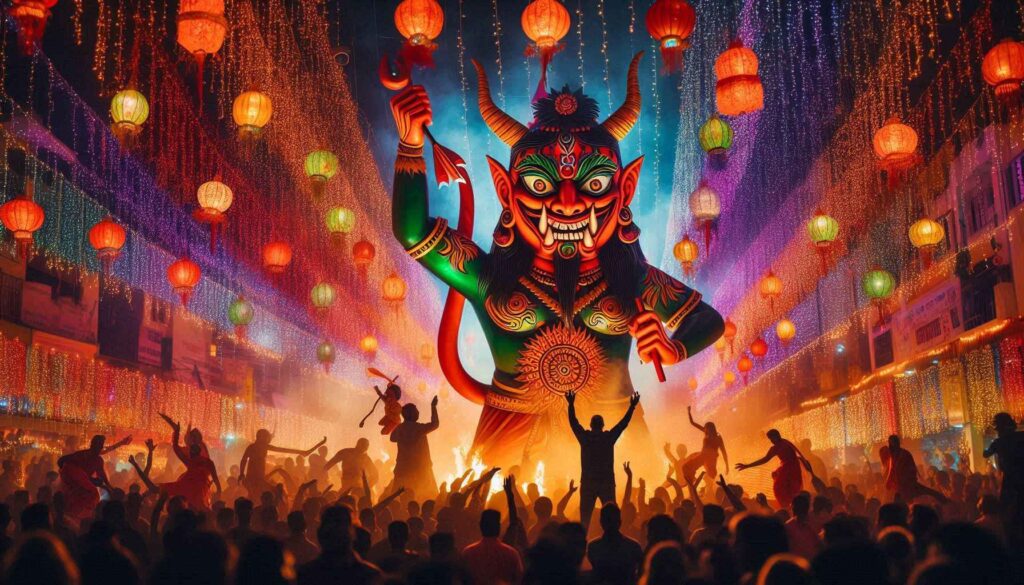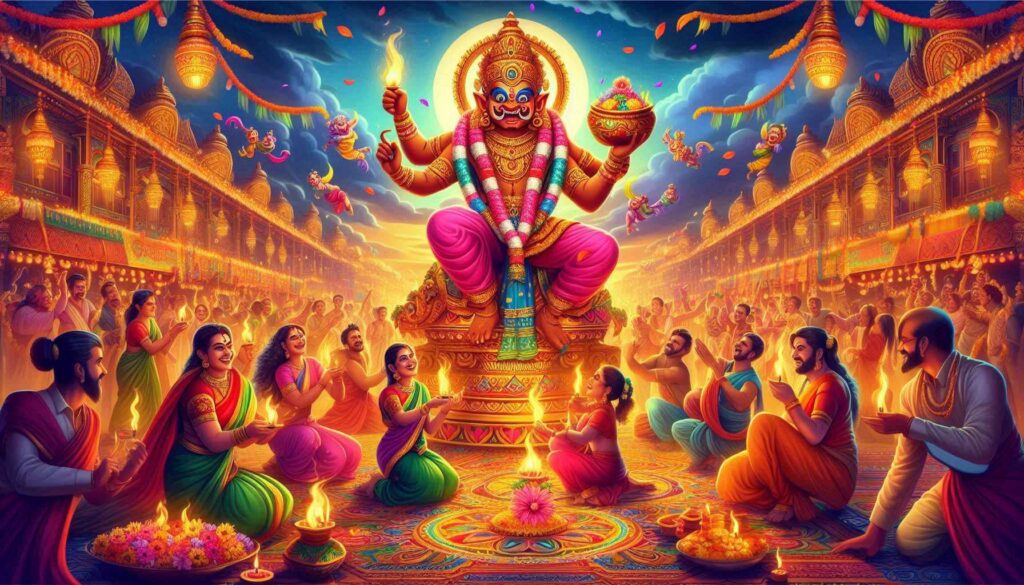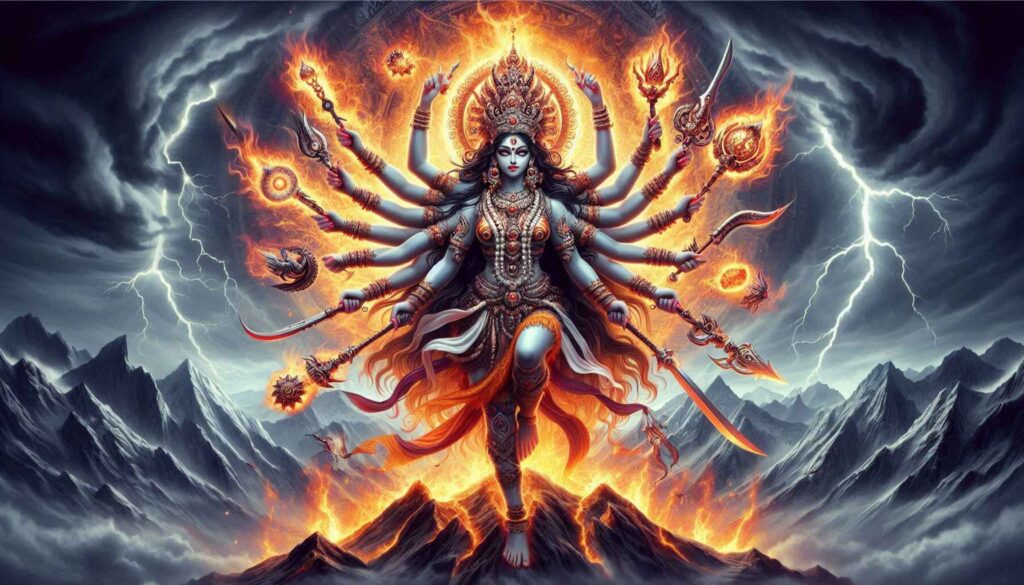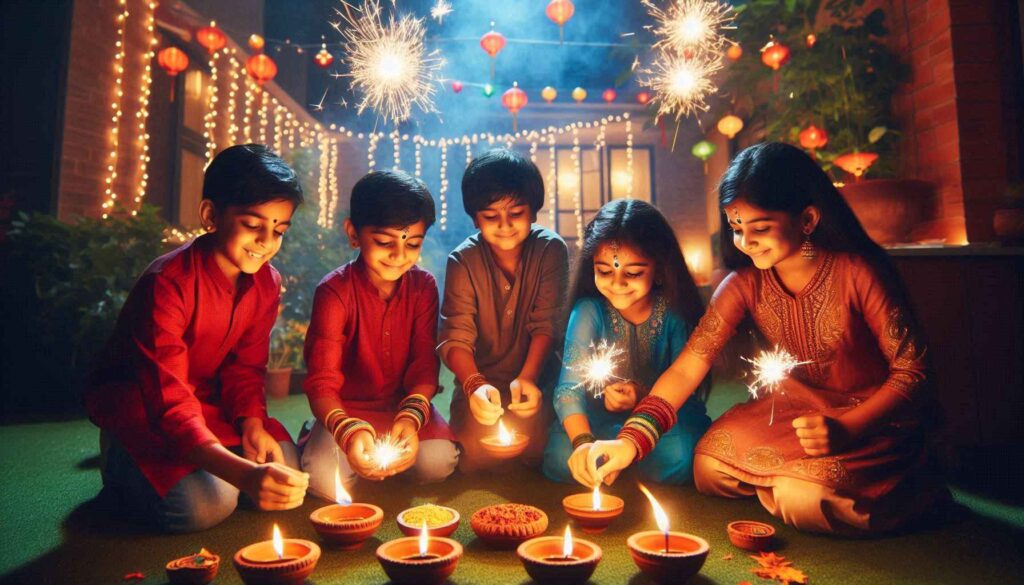Naraka Chaturdashi: Triumph of Good Over Evil

Introduction
Naraka Chaturdashi, also known as Kali Chaudas, Roop Chaudas, or Choti Diwali, is one of the most significant Hindu festivals, celebrated on the 14th day of Krishna Paksha (waning moon) in the month of Ashwin. It falls a day before Diwali, the grand festival of lights, and is dedicated to the victory of good over evil. The day marks the slaying of the demon Narakasura by Lord Krishna, freeing thousands of imprisoned souls from the demon’s tyranny.
This festival is not only a celebration of physical victory but also symbolic of the inner spiritual battle between ignorance and knowledge, darkness and light. The festival emphasizes the cleansing of the self, the elimination of negative energies, and the triumph of righteous forces.
Read More About Hindu Philosophy
In this article, we will explore the stories, rituals, and deeper meanings behind Naraka Chaturdashi, its place in the Diwali celebrations, and how it symbolizes a universal struggle for justice and truth.
The Legend of Naraka Chaturdashi

The legend most commonly associated with Naraka Chaturdashi is that of Narakasura, the demon king of Pragjyotishpur (modern-day Assam). Narakasura was the son of Bhumi Devi (the Earth Goddess) and had gained immense power through penance. However, over time, he became arrogant and began to terrorize the Devas (celestial beings), imprisoning 16,000 women and stealing the earrings of Aditi, the mother of the gods.
In response to his growing tyranny, the gods sought help from Lord Krishna. With the help of his consort Satyabhama, who was an incarnation of Bhumi Devi, Krishna fought and killed Narakasura. The demon’s dying wish was that his death be remembered and celebrated as a day of joy and triumph over evil. Since then, Naraka Chaturdashi has been celebrated as the day when good triumphed over evil, and freedom was restored.
- Quote from the Bhagavad Gita: “Whenever there is a decline in righteousness and an increase in unrighteousness, O Arjuna, at that time I manifest myself on earth.” This verse resonates with the essence of Naraka Chaturdashi, where Krishna’s intervention restores balance and righteousness.
Spiritual Symbolism of Naraka Chaturdashi
Beyond the legendary story of Narakasura’s defeat, Naraka Chaturdashi holds deep spiritual meaning. The festival symbolizes the destruction of ignorance and ego, represented by the demon Narakasura, which cloud the mind and lead to suffering. Just as Krishna illuminated the world by defeating the demon, the festival encourages people to illuminate their lives by overcoming internal darkness.
The day also represents the purification of the body and soul. Traditionally, people wake up before dawn and apply ubtan (a herbal mixture made of gram flour, turmeric, and sandalwood) on their skin to cleanse themselves. This ritual of anointing the body signifies the removal of impurities, both physical and spiritual.
The Rituals of Naraka Chaturdashi

- Abhyanga Snan (Holy Bath): The ritualistic bath taken early in the morning on Naraka Chaturdashi is called Abhyanga Snan. It is believed that this bath cleanses the body from impurities and washes away sins. The bathwater is often infused with sesame oil, herbs, and flowers. The ritual symbolizes both physical and spiritual purification.In some regions, people light oil lamps (diya) in their homes before taking this bath. The light of the lamps is seen as a symbol of the inner light of the soul, dispelling darkness and ignorance.
- Ubtan Ritual: As part of the purification process, many households prepare a paste made of gram flour, turmeric, rose water, and other herbal ingredients. This ubtan is applied to the body before bathing to cleanse the skin and rejuvenate the senses. The use of turmeric, which is known for its antiseptic properties, symbolizes the act of purifying oneself inside and out.
- Lighting of Lamps: Similar to the rest of Diwali, lighting diyas (lamps) is a crucial part of Naraka Chaturdashi. These lamps symbolize the victory of light over darkness. They are placed at the entrance of homes, in courtyards, and near altars as a way to invite divine blessings.
- Kali Puja: In certain parts of India, particularly in West Bengal and Odisha, Kali Puja is performed on the day of Naraka Chaturdashi. Goddess Kali is revered as the fierce form of Shakti who defeats evil forces. The worship of Kali represents the destruction of negative forces and the ultimate victory of righteousness.
- Breaking of Bitter Fruits: In some traditions, a bitter fruit (often a bitter melon or citrus fruit) is crushed underfoot as a symbolic gesture of the defeat of Narakasura. The fruit represents the demon’s head, and crushing it symbolizes the destruction of negativity.
- Special Feasts and Offerings: After the early morning rituals, families prepare a variety of festive foods, including sweets like laddu, barfi, and savory snacks. These offerings are presented to the deities during prayers and later shared among family members. The feast represents abundance, happiness, and the blessings that follow the victory over evil.
Naraka Chaturdashi and Choti Diwali

Naraka Chaturdashi is often referred to as Choti Diwali because it falls a day before the main Diwali celebration. While Diwali focuses on the return of Lord Rama to Ayodhya and the victory of light over darkness, Naraka Chaturdashi specifically celebrates the personal victory of Lord Krishna over Narakasura.
Choti Diwali is seen as a preparation for the grand Diwali celebrations. Homes are cleaned and decorated with flowers and lamps, and the festive spirit begins to build. The lighting of lamps on Naraka Chaturdashi is not just symbolic of the battle between Krishna and Narakasura but also a metaphor for the personal battles we fight against ignorance and ego.
The Broader Cultural Impact of Naraka Chaturdashi
While Naraka Chaturdashi is traditionally a Hindu festival, its themes of good overcoming evil resonate universally. The festival is celebrated with variations in different regions of India. In South India, for instance, Naraka Chaturdashi is one of the most important days of the Diwali festival. In contrast, in parts of North India, the emphasis is on Kali Chaudas, where Goddess Kali is worshipped as the destroyer of evil.
The festival has transcended religious boundaries in modern times. Its emphasis on cleansing, purification, and illumination is universally applicable, making it a day of introspection and spiritual renewal for many people.
- Quote from Swami Vivekananda: “The light that shines inside you is greater than the darkness around you.” This quote captures the essence of Naraka Chaturdashi’s message: that inner light and goodness will always triumph over the outer darkness of evil.
Environmental and Eco-Friendly Celebrations
With increasing awareness about the environmental impact of traditional festival practices, many people are now opting for eco-friendly ways to celebrate Naraka Chaturdashi. Instead of using firecrackers that cause air and noise pollution, families are choosing to light clay lamps (diyas) and use natural decorations like flowers, leaves, and organic colors for rangoli.
Furthermore, the trend of using chemical-free ubtan mixtures and herbal ingredients for the cleansing ritual aligns with the festival’s original emphasis on purity and naturalness.
Conclusion: The Eternal Message of Naraka Chaturdashi
Naraka Chaturdashi is a festival that celebrates the triumph of righteousness, the cleansing of the soul, and the victory of good over evil. Through its various rituals—whether it’s the ritual bath, the lighting of lamps, or the breaking of bitter fruit—the festival reminds us of the constant struggle between our higher and lower selves.
Just as Lord Krishna destroyed the demon Narakasura, we too must strive to conquer the demons within us—ignorance, greed, and anger. In doing so, we can illuminate our lives with the light of knowledge, compassion, and love.
As you prepare to celebrate Naraka Chaturdashi, remember that the festival’s true essence lies not just in external rituals but in the inner transformation it seeks to inspire. It is an opportunity to reflect on your own personal journey, to cleanse the negativity within, and to emerge victorious in your pursuit of truth and light.


